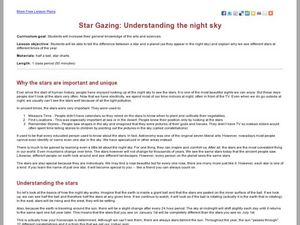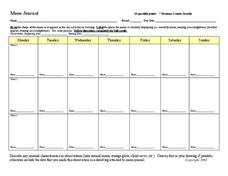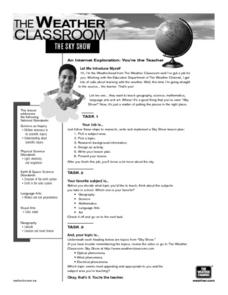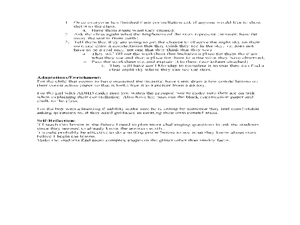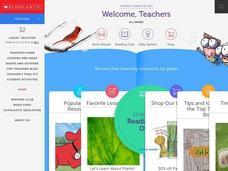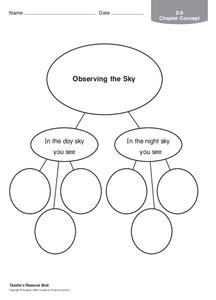National Center for Case Study Teaching in Science
Mask of the Black God
Finally, an astronomy activity for the high schooler! Explorers are able to read star maps for finding objects in the night sky by determining celestial coordinates. In particular, they locate the Pleiades and read about a Navajo legend...
Curated OER
SKY PATHS: STUDYING THE MOVEMENT OF CELESTIAL OBJECTS
Pupils observe the position of an object in the sky by describing its location relative to another object or the background, describe an object's motion by tracing and measuring its position over time, and create their own myths about...
Curated OER
Star Gazing: Understanding the night sky
Students observe star charts to understand the difference between a star and a planet. In this star lesson plan, students also explain why we see different stars at different times of the year.
Curated OER
The Starry Night Time and Day Time
Second graders complete a unit of lessons on the solar system. They complete various art projects inspired by Van Gogh's 'Starry Night,' create a moon phases book, create a moon phase wind chime, develop a timeline of space exploration,...
Curated OER
Investigation 6 - Celestial Model
Third graders investigate why stars appear to move across the night sky.
Curated OER
Exploring Mars
Learners, working in small groups construct scale models of the planets and solar system. They examine images of Mars and discuss what might have caused the features. They record facts about their planetary research in their journals and...
Curated OER
Sky 2: Shadows
Students explore space science by participating in a shadow experiment. In this sky observation lesson, students identify how the sun creates different sized shadows by moving across the horizon. Students utilize yard sticks, markers,...
Curated OER
Sky Watchers: Ancient Astronomers
Students close their eyes and picture the sky. They are asked to brainstorm things they may see in the course of a night and day, such as the movement of the sun, moon, and stars. Students work in groups to coduct their research. They...
Curated OER
Ranger Rick's Observing Night Lights
In this Ranger Rick's observing night lights worksheet, students observe and record the lights in their neighborhood at night and the effect on the environment.
Curated OER
Moon Journal
In this astronomy worksheet, students draw the shape of the moon as it appears in the sky each night for three weeks. With their drawings they include the moon phase and any unusual characteristics they observe.
Curated OER
Observing The Sky
In this space science instructional activity, learners find the words that are related to the observations made of constellations and other related puzzles.
Curated OER
Day and Night
Students using experiments try to demonstrate how observations can be affected by the cycles of night and day.
Curated OER
Constructing a Planetarium
Learners work together to create their own planetarium. They observe the night sky and make a design. They also examine constellations and paint them onto the model of the planetarium.
Curated OER
The Sky Show
Young scholars use lecture and research to answer the question: Why is the sky blue? students research a variety of other sky phenomena, chart their observations and participate in experiments.
Curated OER
Size of Stars
Fifth graders draw constellations in the sky and use the brightness levels of stars to show how big they are. In this constellations lesson plan, 5th graders describe what they see in the night sky by discussing the star's distances.
Curated OER
World In Motion Curriculum
Middle schoolers explore the night sky and its solar system. Using a Digitarium planetarium system, students observe four constellations. They discover the phases of the moon and eclipses. Middle schoolers recognize the difference...
Curated OER
Sky 2: Shadows
students will explore making shadows and tracking the movement of an object over the course of a day to look for patterns. It is best to couple this shadow activity with reading the book, Bear Shadow, and making a map of Bear's...
Curated OER
Satellite Images- Night Time
Fourth graders study the geography and population distribution of various places on earth. They utilize actual satellite images of the night sky (lights showing heavily around area of dense population) to study and make observations...
Curated OER
It's Still Polaris
Students observe the changing night sky over the course of an evening and chart the circumpolar stars as they traverse the sky in a progression around Polaris. They infer and discuss the cause of the changing star positions.
Intel
Starquest
Almost every ancient culture observed the stars and saw pictures in the patterns. Studying stars allowed them to guide travelers, determine when to plant crops, when to harvest food, and the stories surrounding the images include some of...
Curated OER
Sundials: Observing and Using Shadows
Learners build sundials and observe changes in shadows over the course of one or more days. They identify patterns in the shadows and discuss how shadows may be used to tell time.
Curated OER
What's Up?
Students examine the vocabulary and objects associated with objects in the sky and weather. They observe the sky outside of their classroom and create a list of things in the sky. Students then analyze a poster, read and discuss key...
Curated OER
Water Works Wonders
Students examine where water is found in the world, how we use it, and the various forms it takes. They observe the refraction of light through a prism, record the day and night sky over a week's time, and create a topographic model of...
Curated OER
Observing the Sky
In this sky worksheet, students will write down 3 things they see in the sky during the day and 3 things they see in the sky at night. This worksheet is a graphic organizer.




